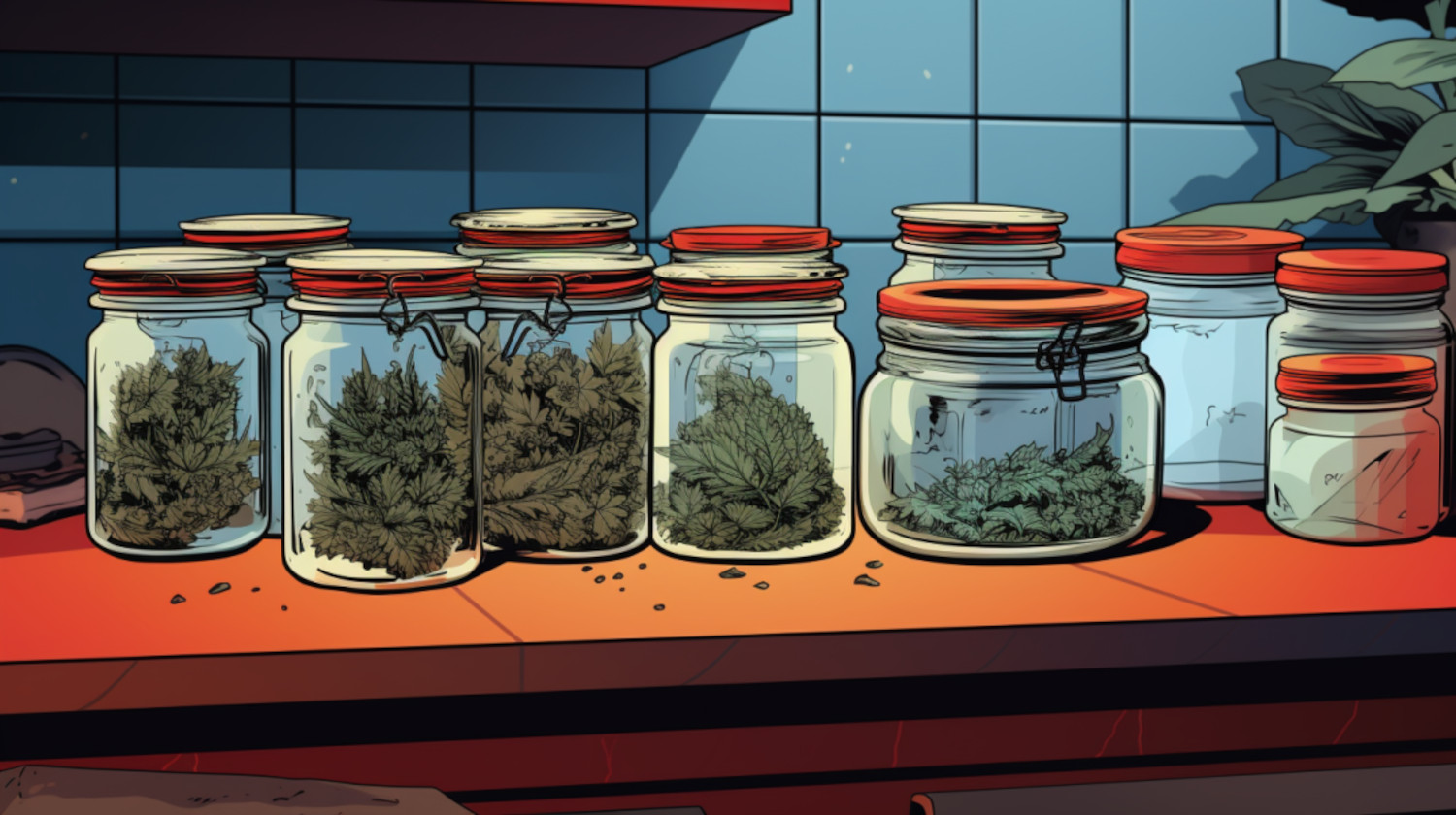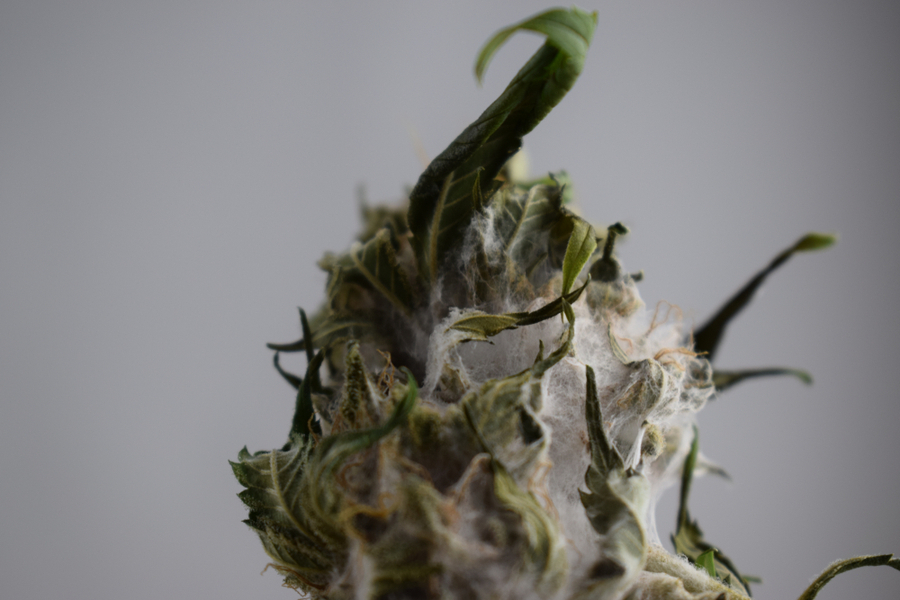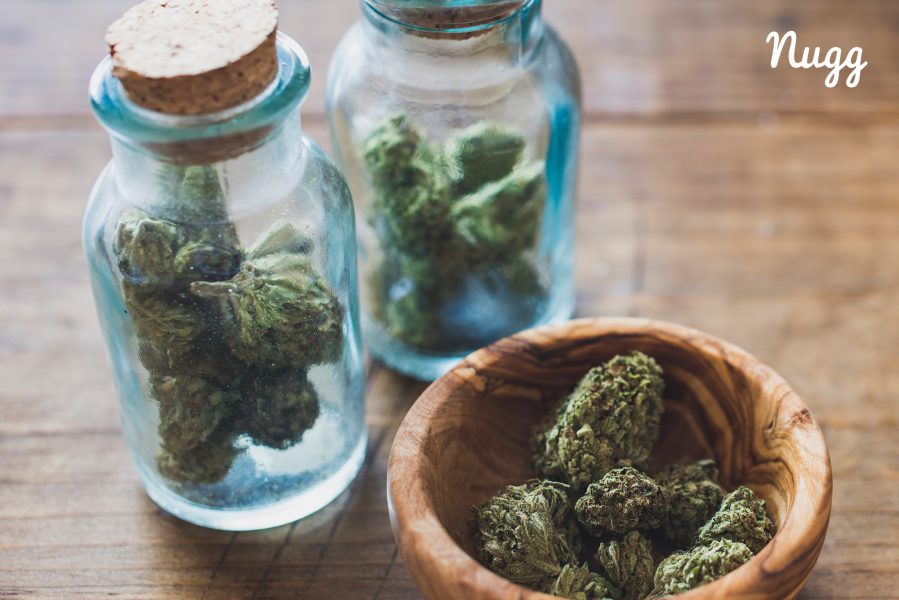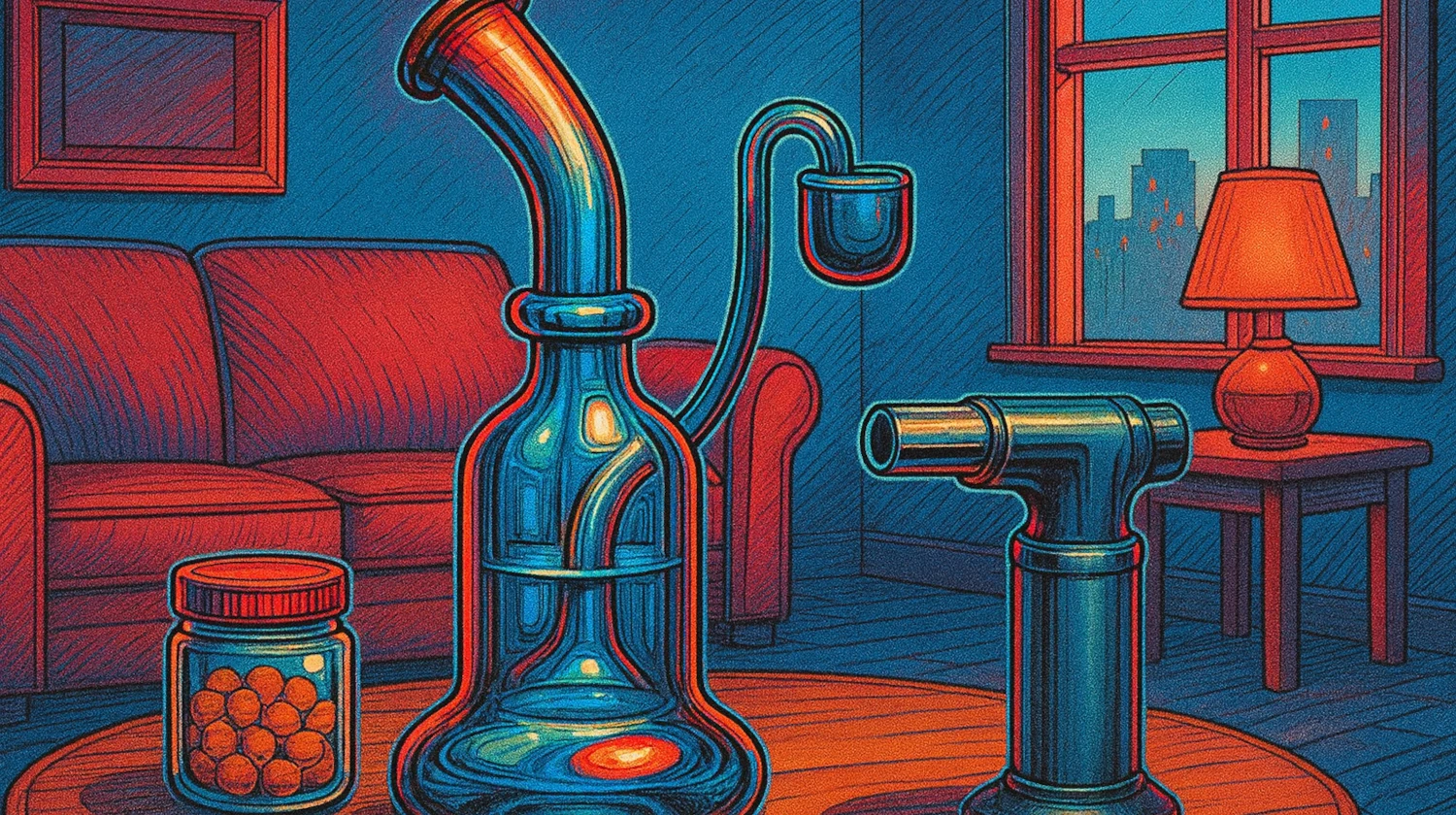In This Article
- What Happens if Cannabis is not Fresh?
- How to Keep your Weed Fresh
- ✓ Store in a UV-protected, airtight glass container
- ✓ Use a humidity pack
- ✓ Store in a humidor
- ✓ Store in a cool environment
- ✓ Grind only what you need
- ✓ Shop smart
- What NOT to Do When Trying to Keep Weed Fresh
- x Don’t store marijuana in plastic or silicone
- x Don’t keep cannabis in the freezer or fridge
- x Don’t store your bud in a damp environment
- x Don’t expose your cannabis to light or air for long periods
- x Try to avoid buying cannabis flower in bulk
- x Don’t wait to enjoy!
- Resources
Several factors can affect the effects of a bud or flower: strain, method of consumption, and, of course, freshness. Dried-out weed can lose its flavor, aroma, and potency over time, while weed that’s too moist or damp can be harder to smoke and host toxic mold and other pathogens.
This article explains how to keep cannabis fresh for a more enjoyable experience.
What Happens if Cannabis is not Fresh?
When weed is too dried out:
- Loss of aroma and flavor. If cannabis has become too dried out, the fragile terpenes and flavonoids degrade more quickly. Losing terpenes and flavonoids causes the flower to lose not only its flavor but its scent as well.
- Loss of potency. If cannabis has been dried out over a long period of exposure to oxygen and light, cannabinoids like THCA will begin to degrade, making for a less potent high.
- Harsh to inhale. Smoking weed that is too dried out often causes users to experience a harsher inhale. This can increase throat and lung irritation, resulting in more coughing.
If your cannabis is too dry, check out our guide for How to Perfectly Rehydrate Weed.
When weed is too moist:
- Difficult to grind. When cannabis flowers have a high moisture content, it is often wet and sticky, making it difficult to break apart with a grinder.
- Does not burn easily. Unfortunately, wet weed is difficult to smoke and can harm your lungs when inhaled. Wet weed will also not burn evenly, if it burns at all, depending on the moisture content.
- Wet flower weighs more than dried flower (but still costs the same). When flower has a high moisture content, it also has a heavier weight. So if you purchase cannabis flower with too high of moisture content, you’re getting less cannabis by weight than you would if the flower had an ideal moisture content.
- Mold and pathogen formation. If your weed is too moist, it has a higher chance of developing mold and other bacteria and pathogens that thrive in wet conditions. Inhaling these toxins can lead to difficulty breathing and the potential for pneumonia.
To learn more about mold in cannabis, head over to our article, All You Need to Know About Moldy Weed.
How to Keep your Weed Fresh
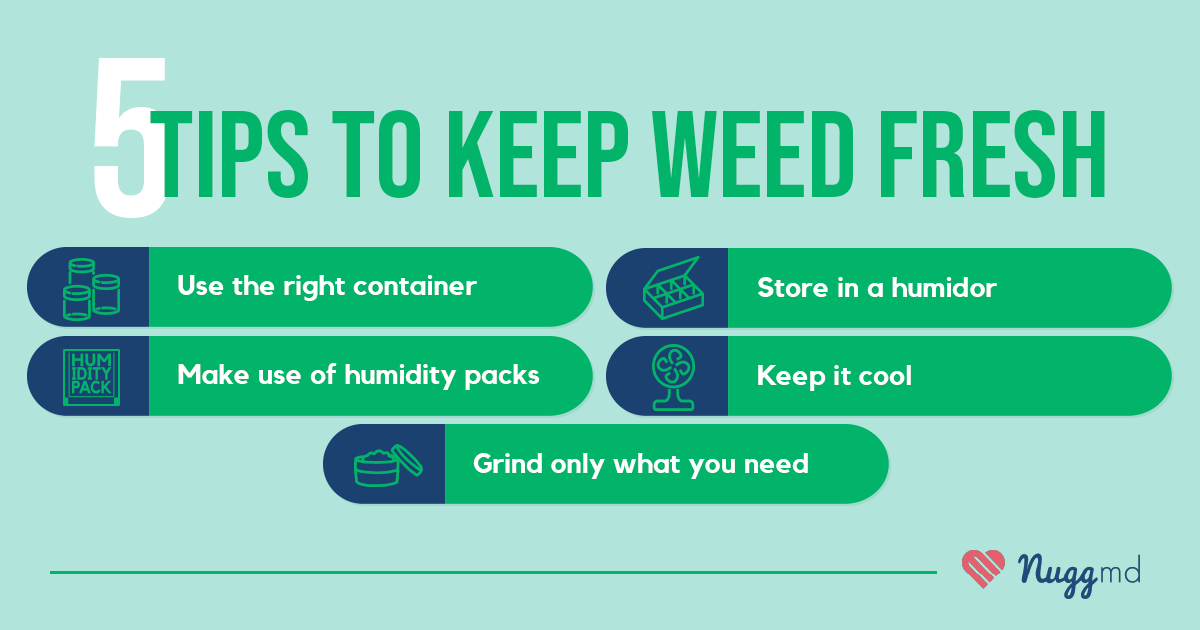
Keeping your weed fresh is key to maintaining the quality of your cannabis, whether it be for just a short period or if it is for long-term storage.
Below, we provide some suggestions on how to keep your weed fresh to get the best taste, aroma, and effect.
✓ Store in a UV-protected, airtight glass container
Storing your cannabis properly is necessary to help prevent the degradation of cannabinoids and terpenes due to light, oxygen, and heat. To help prevent and slow the degradation of these compounds, we recommend you store your flower in a UV-protected, airtight glass container to protect it from light and oxygen.
While cannabinoid degradation can occur over time, it does take about three months to see a significant dip in levels of cannabinoids like THC. A 2019 study tested cannabinoid degradation over time. The researchers found that storing cannabis flower in the dark for 24 hours in a refrigerator with a constant temperature of 39℉ showed little difference in cannabinoid levels after 300 days. However, the cannabis stored in the dark at room temperature had a difference of 13% in THC after just 100 days.1
✓ Use a humidity pack
Humidity packs help maintain the optimal moisture content in your cannabis flower. You can store these packs inside your cannabis jar or bag to help keep your weed fresh.
✓ Store in a humidor
Yes, you can store your cannabis in a humidor. A humidor is a wooden box typically made from cedar that keeps cigars at the optimal humidity level. These boxes contain a humidifier and a hygrometer to help you control and maintain the optimal humidity for your cannabis flower.
✓ Store in a cool environment
Ideally, you should keep cannabis at temperatures between 50℉ and 86℉ to help prevent the degradation of cannabinoids and terpenes due to excessive heat exposure.
✓ Grind only what you need
It is not uncommon to grind a nug or two to fill your typical grinder, but unless it is going to be smoked within the day, we advise grinding only what you need for your current bowl.
Grinding the flower agitates and breaks off the trichomes, which is how you get kief. However, when doing this, you also speed up the rate at which the terpenes degrade. When you leave ground flower in your grinder, it’s more likely to dry out and lose its aroma and flavor more quickly.
✓ Shop smart
In most legal cannabis states, cannabis flower must have a harvest date printed on the label placed on the container. Asking your budtender when the bud was harvested will help you get the freshest weed on the shelves.
To learn more about selecting quality cannabis flower, check out these 9 Ways to Tell Good vs. Bad Cannabis.
What NOT to Do When Trying to Keep Weed Fresh
Along with taking the above steps in order to help prevent your weed from drying out, we also recommend a few steps to avoid if you want to keep your cannabis properly hydrated.
x Don’t store marijuana in plastic or silicone
Storing cannabis in plastic or silicone is not an ideal storage method as the trichomes often stick to the container walls, reducing the flower's cannabinoid and terpene levels. Plastic should only be considered for the short-term storage of cannabis.
Recent research has also shown that terpenes can cause the silicone to degrade, which may lead to toxins leaching into your flower. This is especially the case for cannabis extracts and concentrates.
x Don’t keep cannabis in the freezer or fridge
Storing cannabis in your freezer or fridge may seem like a good idea. Still, the temperature can actually fluctuate more than in other storage areas because the doors are repeatedly opened and closed. This fluctuation in temperature can cause moisture to build up in the storage containers, leading to mold formation and other pathogens.
Another concern regarding storing cannabis in the freezer is the fragility of the trichomes on the flower. If the flower is not stored correctly, trichomes can break off, reducing the cannabinoids and terpenes present in the flower.
x Don’t store your bud in a damp environment
Storing cannabis in a damp environment is a recipe for mold and other pathogen growth and should be avoided. This includes any environments where the humidity may also be extremely high.
x Don’t expose your cannabis to light or air for long periods
Cannabinoids and terpenes degrade quickly when exposed to light and air. When not smoking or grinding your cannabis, we recommend that it be stored in an air-tight container that is either UV-protective or otherwise kept away from light.
x Try to avoid buying cannabis flower in bulk
While we understand the incentive that comes with buying in bulk, unless the flower is going to be smoked in a timely manner, purchasing too much can result in your flower drying out before you’re ready to enjoy it.
x Don’t wait to enjoy!
Along with not buying in bulk and storing properly, the best way to keep your weed fresh is to enjoy it when you buy it! We recommend using the cannabis you purchased within three months to avoid it from becoming too dried out.
Resources
- Zamengo L, Bettin C, Badocco D, Di Marco V, Miolo G, Frison G. The role of time and storage conditions on the composition of hashish and marijuana samples: A four-year study. Forensic science international. 2019;298:131-137. doi:https://doi.org/10.1016/j.forsciint.2019.02.058 ↩︎
The information in this article and any included images or charts are for educational purposes only. This information is neither a substitute for, nor does it replace, professional legal advice or medical advice, diagnosis, or treatment. If you have any concerns or questions about laws, regulations, or your health, you should always consult with an attorney, physician or other licensed professional.

